Apparel and Garment Technologist
Entry Level Qualification
10
Career Fields
Apparel & Accessories
For Specially Abled






Career Entrance Exam
About Career
As an Apparel and Garment Technologist, you will work in large-scale apparel or garment manufacturing facilities as well as small to medium-scale facilities. Your primary role will be to supervise the process of apparel or garment production, right from selecting fabric and pattern making to sewing and finishing.
Typically, Fashion or Apparel Designers make the design and then Apparel and Garment Technologists take over. As an Apparel and Garment Technologist, you will work in close collaboration with the pattern makers, pattern cutters, fabric graders, sewing and knitting machine operators, embroiders, weavers, and other workers. You will ensure that the apparel or garments are manufactured as per the design and the design specifications.
Key Roles & Responsibilities
1. Selection and purchase of fabric or clothing materials such as cotton, leather, denim, silk, and wool as well as other clothing materials like buttons, zippers, etc.
2. Planning, implementation, and administration of Apparel or garment production process which includes cutting of fabric, sewing, stitching, embroidery, washing, grading, finishing, quality checking, and packaging.
3. Ensure delivery of the orders for apparel or garments as per the design, size, and fittings.
4. Ensure that all equipment and machinery for apparel or garment production are operated and maintained properly.
PARTICULARS | DESCRIPTION |
Name | Apparel and Garment Technologist |
Purpose | Selection and Purchase of Fabric |
Career Field | Apparel & Accessories |
Required Entrance Exam | NIFT GAT, NID DAT UG, NID DAT PG, UCEED, CEED |
Average Salary | 150000 - 200000 Rs. Per Year |
Companies For You | Arvind Mills, Bombay Rayon Fashion, Gokaldas Export & Many More |
Who is Eligible | Class 10th |
Career Entry Pathway
Class 10 all subjects as per the scheme of studies – Diploma in Garment Manufacturing Technology.
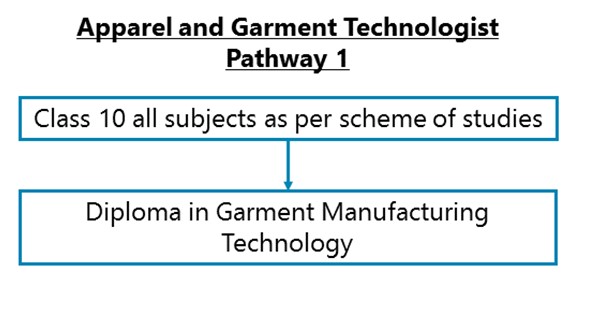
After class 10, you can do a Polytechnic Diploma in Garment Manufacturing Technology. The duration of the course is 3 years.
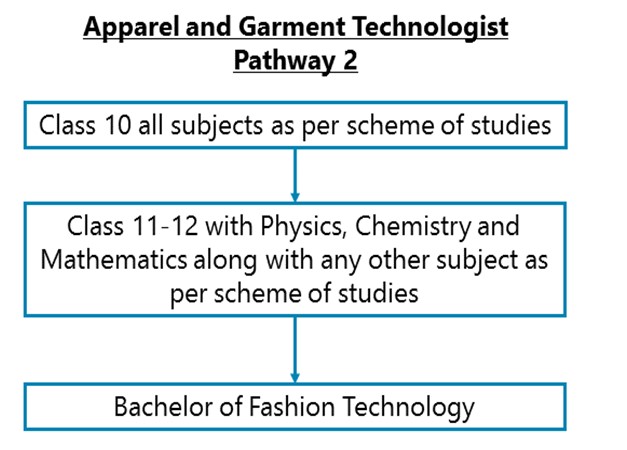
After class 12, you can do a Bachelor's Degree in Fashion Technology and then get a job.
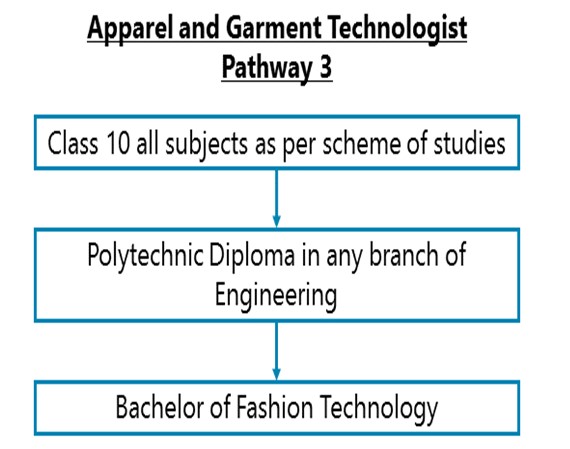
After class 10, you can do a Diploma in any branch of Engineering and thereafter enroll in a program in Bachelor of Fashion Technology. You can get a job after completion of your Bachelor's Degree in Fashion Technology.
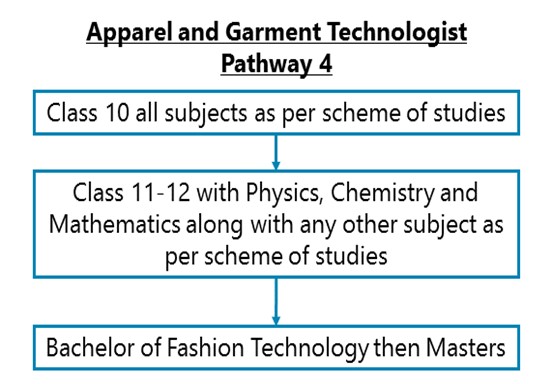
After class 12, you can enroll for a course or program in Fashion Technology followed by a Master's Degree in Fashion Technology. After completion, you can get a job.
Required Qualification & Competencies
Undergraduate studies after school
1. After your Class 10, you can either enroll for a higher / senior secondary school studies with Physics, Chemistry, and Mathematics along with any other subjects as per the scheme of studies or you can enroll for a Diploma in Garment Production Technology / Garment Manufacturing. You can get a job after your Diploma.
2. If you complete Class 12, you can enroll for a Bachelor's Degree in Fashion Technology. After your Bachelor's Degree, you can get a job.
Post Graduate studies
A postgraduate level qualification is mostly not required to get a job. However, if you want to go for higher studies, you can do a Master’s Degree in Fashion Technology.
MINIMUM EDUCATION REQUIRED | MAXIMUM EDUCATION REQUIRED |
Post-Secondary Certificate / Diploma Programs for which the minimum eligibility is a pass in class X. | Under Graduate Undergraduate Degree / Honours Diploma / Graduate Diploma (equivalent to a Degree) Programs for which the minimum eligibility is a pass in Higher Secondary / Class XII School Leaving examination. |
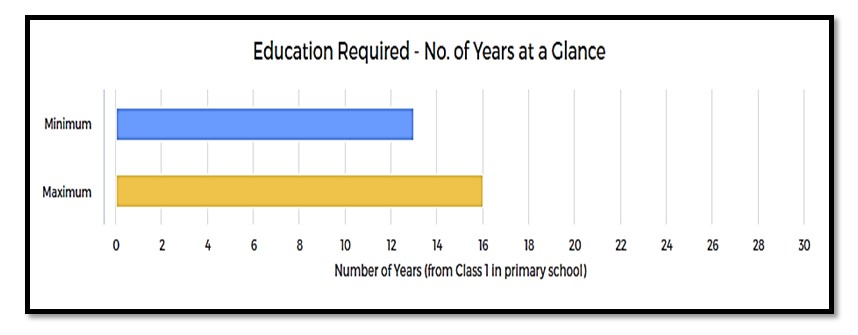
Competencies Required
Interest
1. Enterprising: You should have an interest in Enterprising Occupations. Enterprising occupations involve taking initiative, initiating actions, and planning to achieve goals, often business goals. These involve gathering resources and leading people to get things done. These require decision-making, risk-taking, and action orientation.
2. Realistic: You should have an interest in Realistic Occupations. Realistic occupations involve more practical and hands-on activities than paperwork or office work. Realistic occupations often involve physical activities for getting things done using various tools and equipment.
3. Conventional: You should have interests in Conventional Occupations. Conventional occupations involve repetitive and routine tasks as well as fixed processes or procedures for getting things done. These occupations involve working more with data, systems, and procedures and less with ideas or creativity.
Knowledge
1. Biological Sciences: Knowledge of plants and animals, their anatomical structure, cell structure, tissues, physiological functions, evolution, and all other related aspects.
2. Healthcare Science and Services: Knowledge of different fields that are related to offering various types of healthcare services to people; assisting physicians and surgeons to carry out diagnosis, treatment, and prevention of human diseases, ailments, and disorders. This includes knowledge of different practices apart from medicine which are used to treat and prevent human diseases or to provide holistic healthcare and wellness. This also includes knowledge about drugs and medicines.
Skills
1. Active Listening: Giving full attention to what other people are saying, understanding the points being made by others, asking questions, etc.
2. Coordination: Skills in working together with other people to get things done.
3. Critical Thinking: Skills in the analysis of complex situations, using logic and reasoning to understand the situations and take appropriate actions or make interpretations and inferences.
4. Judgment and Decision Making: Skills in considering the pros and cons of various decision alternatives; considering costs and benefits; and making appropriate and suitable decisions.
5. Problem Solving: Skills in analysis and understanding of problems, evaluating various options to solve the problems, and using the best option to solve the problems.
6. Technical: Skills in using various technologies and technical methods to get things done or solve problems.
7. Time Management: Skills in prioritizing work, and managing time effectively.
8. Troubleshooting: Skills in determining causes of operating errors and deciding what to do about it
Abilities
1. Abstract Reasoning: The ability to understand ideas that are not expressed in words or numbers; the ability to understand concepts that are not clearly expressed verbally or otherwise.
2. Deductive Reasoning: The ability to apply general rules and common logic to specific problems to produce answers that are logical and make sense. For example, understanding the reasons behind an event or a situation using general rules and common logic
3. Inductive Reasoning: The ability to combine pieces of information from various sources, concepts, and theories to form general rules or conclusions. For example, analyzing various events or situations to come out with a set of rules or conclusions
4. Inter-Personal: The ability to build and maintain good relationships with others at workplaces and elsewhere.
5. Oral Comprehension: The ability to listen to and understand information and ideas presented through spoken words and sentences.
6. Oral Expression: The ability to communicate information and ideas in speaking so others will understand.
7. Problem Sensitivity: The ability to tell when something is wrong or is likely to go wrong. It does not involve solving the problem, only recognizing there is a problem.
8. Verbal Reasoning: The ability to think and reason with words; the ability to reason out ideas expressed in words.
Career - Job Opportunities & Profiles
After your Diploma / Bachelor's Degree in Garment / Fashion Technology, you can get a job in the garment manufacturing industry or with small to medium-scale fashion designers. Some of the jobs positions you can get are (mostly as an Assistant Manager / Associate / Technician in the following job positions):
1. Garment Pattern Master
2. Garment Technologist
3. Garment Technicians
4. Fabric Technologist
5. Fabric Development Manager
6. Product Development Technologist
7. Production Planner
8. Quality Controller / Quality Testing Manager
9. Shop Floor Manager
10. Sampling Room Coordinator
11. Raw Material Technician / Developer
12. Buyer/ Sourcing Manager
Some companies where you can get a job:
1. Arvind Mills
2. Bombay Rayon Fashion
3. Gokaldas Export
4. Madura Garments
5. Sabyasachi (famous designer)
6. The Shirt Company
7. Modern Denim
8. Ritu Kumar (famous designer)
Work Environment
Usually, professionals in this job profile have to work from apparel manufacturing facilities (both small-scale and large-scale) or fashion designing studios. Sometimes, garment technology professionals have to spend long hours in manufacturing facilities, especially when it is a large-scale production facility. The minimum working hours every week range between 40-50 hours, although one may be required to extend the working hours if there are strict deadlines to meet.
Specialisation Tracks In This Career
1. Garment Pattern/Cutting Master
Garment Pattern and Cutting Masters are professionals who make sure that clothing fabrics are patterned and cut as per the design of various apparel such as skirts, trousers, shirts, etc. They operate various machines for making patterns and cutting or supervising the work of Pattern Makers and Cutters.
2. Garment Technician
Garment Technicians ensure that garments are manufactured as per the design specifications and order requirements from the buyers. They operate various equipment and machines used for sewing, stitching, embroidery, washing, grading, and finishing. They supervise the work of other co-workers in garment manufacturing.
3. Buyer (Apparel & Garment)
Buyers work in collaboration with Fashion designers, Fashion merchandisers, and other co-workers to procure the right fabric and other materials such as threads, buttons, zippers, etc. for garment production. Buyers ensure that adequate quantities of various materials required for garment manufacturing are stocked at the right time.
4. Fabric Technologist
Fabric Technologists work in close coordination with Fashion Designers, Fashion Merchandisers, Buyers, and Garment Technicians to ensure that the right fabric and other clothing materials are procured by the Buyers. They ensure that the right methods and processes are used to manufacture garments as per the design specifications.
5. Testing Manager (Apparel and Garment)
Testing Managers conduct quality tests on fabric procured for manufacturing garments and also carry out all kinds of quality checks on finished garments to ensure that they are manufactured as per requirements and design specifications.
6. Apparel/ Garment Material Developer
Apparel/Garment Materials Developers work with the research and development teams in garment manufacturing facilities to develop new fabric, new dyes for coloring, new methods for garment coloring, washing and finishing, and so on.
Career Growth
Growth opportunities are limited in this career. However, you can get promoted in your job or change jobs when you are more experienced. You can get into the middle level and then senior level jobs in 8-12 years.
Salary Offered
1. Salaries vary according to job profiles and the kind of manufacturing facilities you get to work at.
2. In entry-level jobs: You may expect to get about Rs. 1,80,000 – 2,40,000 per annum
3. Salaries increase with your work experience and as you get promoted.
4. In mid-level jobs, with 6-12 years of work experience, you may expect to get about Rs. 6,00,000 – 15,00,000 per annum.
5. In senior-level jobs, with 12-20 years of work experience, you may expect to get about Rs. 16,00,000-18,00,000 per annum.
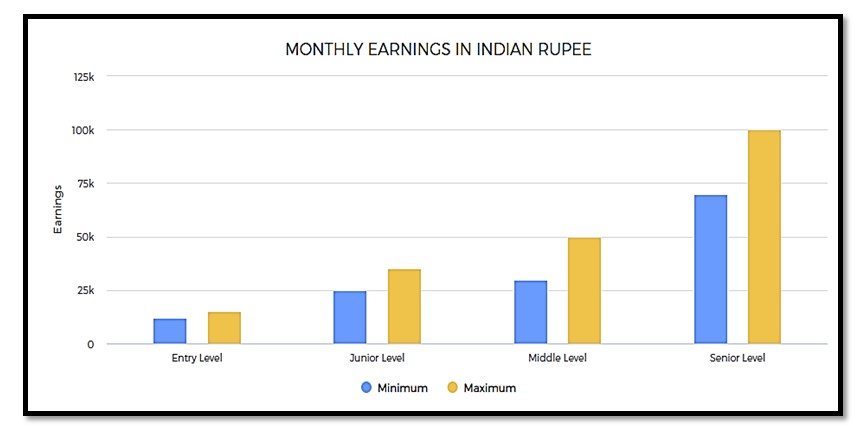
Monthly Earnings In Indian Rupee
Entry Level | Junior Level | Mid Level | Senior Level | ||||
Min Earning | Max Earning | Min Earning | Max Earning | Min Earning | Max Earning | Min Earning | Max Earning |
12000 | 15000 | 25000 | 35000 | 30000 | 50000 | 70000 | 100000 |
1. Entry level: 0 - 2 years of work experience
2. Junior Level: From 1 to 12 years of work experience
3. Mid-Level: From 5 to 20+ years of work experience
4. Senior Level: From 10 to 25+ years of work experience (there could be exceptions in some high-end technical, financial, engineering, creative, management, sports, and other careers; also shortly, people will reach these levels much faster in many careers and some careers, these levels will have no meaning as those careers will be completely tech skill driven such as even now, there is almost no level in a Cyber Security Expert’s job)
Work Activities
1. Communicating with co-workers and others: Communicating with people in writing, verbally or otherwise inside your workplace and various other people who have professional relationships with your place of work including vendors, government officials, etc., or with people at large
2. Decision-making and problem-solving: Analysis of data and information; evaluation of alternative decisions and results of decisions; making the right decisions and solving problems.
3. Developing and maintaining interpersonal relationships: Developing professional relationships with co-workers and others outside organizations and maintaining good relationships.
4. Getting Information and learning: Observing, hearing, reading, using computers, or otherwise obtaining information and learning from it.
5. Handling administrative activities: Handling various administrative tasks and managing day-to-day operations.
6. Inspecting equipment, systems, structures, and materials: Inspecting equipment, systems, structures, and materials to ascertain quality, performance, defects, causes of errors, etc.
7. Inspecting situations, events, and people: Inspecting situations, events, and people to understand the reasons and causes for the situation or events to happen; inspecting people to understand reasons behind their behavior and actions.
8. Managing and supervising: Managing and supervising the work of others; setting goals; giving instructions; monitoring work performance, etc.
9. Updating and using relevant knowledge: Keeping updated with the latest knowledge relevant to your fields of work and using the relevant knowledge in getting things done.
10. Using computers for work: Using computers for day-to-day office work; using computer software for various applications in day-to-day professional work; entering data and processing information; for writing.
11. Working in a team: Working in a team of people; developing a team; and maintaining professional relationships among team members.
Future Prospects
The growth prospects of India’s textile and apparel industry are quite good. India’s textile and apparel export is estimated to grow to US$ 82 Billion. These figures indicate a bright future for a career in this industry.
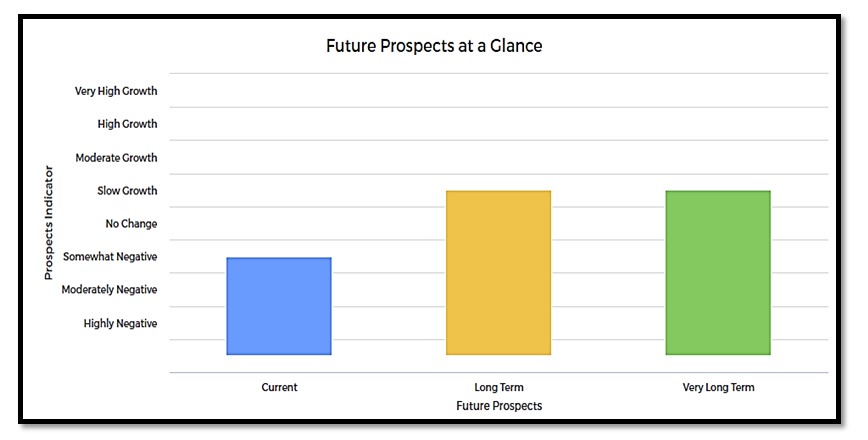
Future Prospects At A Glance
Current (0-1 year) | Long Term (2-5 years) | Very Long Term (6-10 years) |
Somewhat Negative | Slow Growth | Slow Growth |


